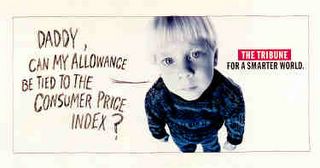Wednesday, March 30, 2005
Who controls the Internet?
Added to this is the growing pressure by the governmental agencies to control the internet. Everybody from National Governments to United Nations wants some piece of the action. Various intelligence depts, software makers, hackers, you name it; somebody controls some part of the process that others want. The major problems/issues related to the internet are copyright laws ( P2P, mp3's, movie downloads etc), porn, and some political discontent publishing.
The P2P software debate went to the US Supreme Court today. Each side presented the basis of the illegitimacy of the p2p software and its defence. The court is yet to decide.
Tuesday, March 29, 2005
Life in Exile
What level is your Organizational Equity?
Tuesday, July 15, 2003
What level is your Organizational Equity?
According to “Build your Organizational Equity” published in “Strategy + Business”, a Booz Allen Hamilton Inc magazine, issue of summer 2003, “organizational equity” is one of the most neglected aspects of career building.
The writer, Art Kleiner, classifies the employees of any organization into two groups. One group, called the “Core group”, consists of the top layer of employees such as CEO, CFO, important personnel such as union leaders. This group is generally the policy making group of any organization and accounts for less than 5 % of the total number of employees working in the organization. The second and less prominent group, accounting for the rest of the organization, is the “transactional group”. The members of this group have no or little-input in the policy matters and basically only transact the policy into implementation. Organizations view such groups are replaceable and largely unimportant to decision making.
So, no one wants to be stuck in the second group. Following orders is boring and does not allow your creativity to emerge. According to the author, the best method of moving from transactional group to core group is to strength your organizational equity, defined as “any share of accumulated wealth, including such intangible forms of social capital as relationships and reputation.”
Now the author gives some good examples, which I have found lead not only to organizational success, but also success in life because the world in which we live in is, after all, a huge organization.
•Fungible Financial Equity: This is the financial part of the equity and is most tangible. Having enough financial assets gives you the choice of starting your own company or not working for sometime. Experts recommend saving enough money, either in saving account or some other method, to sustain yourself and your dependents for at least 9 months without a job. Getting to a threshold is critical since once you achieve that goal, savings become capital and pay large enough dividends for a comfortable lifestyle.
•Rainmaking Equity: This is the ability to be the rainmaker of the organization. Can you achieve something no other person in the organization can such as closing that large contract or building a strong department? Rainmaking qualities are hard to attain but it is not impossible.
•Credential Equity: This is the most visible form of your organizational equity. Degrees and certifications help build this equity. The most evident obstacle is the high-expense and time required to maintain this equity.
•Reputation Equity: The writer explains, “You build your reputation less through the accomplishments you stack up (what you do) than through the way you operate in life (who you are).” Consultants, lawyers, doctors make their careers on this equity.
•Relationship Equity: The most commonly understood quality in organizations, it all depends on ‘who you know and how well do you know vs. what you know’.
•Capability Equity: This is the ability to learn more skills and capabilities to add into your already existing equities. Having capability to learn is widely searched for in interviews.
Monday, March 28, 2005
Who holds the Right to Die?
The Universal Decleration of Human Rights adopted by the United Nations is the most widely agreed upon set of Human Rights. The declaration's importance is mainly due to the second article which enpowers everybody born on this planet.
Article 2.
Everyone is entitled to all the rights and freedoms set forth in this Declaration, without distinction of any kind, such as race, colour, sex, language, religion, political or other opinion, national or social origin, property, birth or other status. Furthermore, no distinction shall be made on the basis of the political, jurisdictional or international status of the country or territory to which a person belongs, whether it be independent, trust, non-self-governing or under any other limitation of sovereignty.
Article 3.
Everyone has the right to life, liberty and security of person.
Article 4.
No one shall be held in slavery or servitude; slavery and the slave trade shall be prohibited in all their forms.
Article 5.
No one shall be subjected to torture or to cruel, inhuman or degrading treatment or punishment.
1. I have the total control over my body and brain.
2. I am not going to be burden on the society.
The negetive con reason, the main reason why many regilious texts ban sucide, is because of the discomfort, distress caused on people who love you. You have no right to casuse pain (Article 4) on others. And lets look it in more rational way, if everybody decides to die and it is ok, why bother live. So ethically speaking, the correct answer is very hard to decide and can be judged only on a casetocase basis by the persons effected themselves. ( Not lawmakers, nor courts)
I understand this issue is more a battle between lawmakers and the judical system in united States, with huge influences by the regilious right. However, I believe the husband is doing the right thing. Thus, i fully support the decision of the courts not to meddle in the life of Terri Schiavo.
Sunday, March 27, 2005
Some Interesting Newspaper Ads

Bail Bonds is such a unique industry
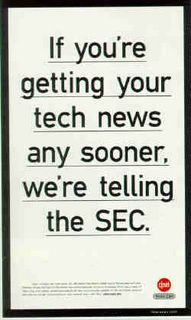
Cnet Rocks, but I like Slashdot better!

Nothing beats that value-added freebie
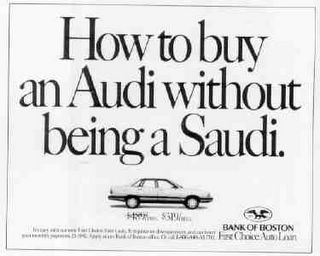
Saudi and Audi, what a combination!

Shock Advert has always paid off, until recently...
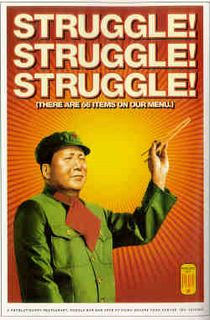
66 Items...One of my Favorites..
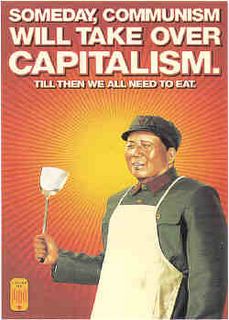
Yes, this also...
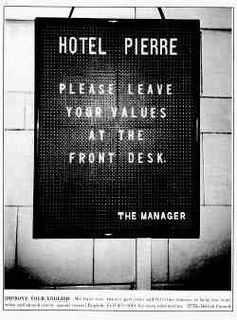
Values at Front desk, sounds like an hotel in Las Vegas

Saturday, March 26, 2005
by Richard Layard . The books is a multi-disinplinary book between psychology, sociology, applied economics, and other fields about what is defined as happiness and how increased western standards of living had no effect on happiness. I had the chance to read only the first few chapters of the book at the bookstore, however, it did captivate my attention of nearly half an hour. The book describes three main ideas that determine happiness in a person.
1. Status Race: We are more happy earning 100k a year when the average salary is say, 60k a year in the neighborhood than we are earning 150k a year compared to average salary of 180k a year. Most memorable quote i read related to this point.
A man is a very wealthy man if he earns 10 dollars more than his wife's sister's husband.
2. Security: Electrons try to be stable and loose energy/gain energy is achieve this state. In the same way, human beings want stability. They hate insecurity in jobs, in general life and are very unhappy about that. Maybe that is the reason why Japan was so successful during the middle of the cenutry, thanks to its no-firing policy at its companies. People tend to be more happier when they dont have to think about something they dont like.
3. Trust: You dont trust everybody and view each and everyone of them in suspision. This is also why you tend to be happiest among your friends and family, because you trust them. If you dont feel comfortable around them, then you got yourself a problem.
Let's start with Astrospeak, an Indiatimes website.
Daily Astrological Forecasts by Pt Kewal Anand Joshi
The period is emotion-charged and gives you greater freedom for self-expression. You have more than a fair share of satisfactory moments. Keep a watch over your health.
Tip of the day:You need to make daily exercise a part of your routine-even if you are very busy. Take extra care of your health now. At work, don't depend on anybody. Instead, innovate and work hard on y0our own steam to win success.
Daily Tarot Forecasts by Dr Deepak and Pinky Vaide
You now need to seek tangible, practical solutions. You will come up with something, so not a time for you to give up. Have faith in yourself.
Rediff.com
Your need to continue being persistent for that change within you, determined to get a new and more dynamic platform at your new work. Your temper is short and you are quick to judge, you choose to be peaceful than right! You recognise the difference, what difference does that make. Only positive, forge ahead!
Deccan.com
You see dreams being fulfilled. At home inability to control children leads to frustration. Your lover is likely to leave you confused. You sacrifice personal priorities for others.
Gulfnews.com
Life would be a lot easier if you could just make plans once and be done with it. But with so many changes going on, even simple arrangements benefit from being reorganised frequently. Instead of battling these, you’re better off exploring everything that arises.

A fisherman peacefully tends his livelihood as Jumeirah life buzzes on around him.
Each country depends on four things for its development. Land, Labour, Capital and finally technology. In-house Technology is only possible if you have the two resources that are needed for it, i.e., Capital and Labour. Land does not play a huge role in technology revolutions of the present day. Land was available, and more importantly, so was capital, thanks to desert atmosphere and oil industry respectively. Both these resources were also available for Saudi Arabia. However the major difference is the way population played a role. Although both countries imported a large expatrite populations for their infrastructure projects, a development of middle class in the UAE has saved it from the problems of its neighbor. A strict control over population demograhics, UAE has successfully is in the process of trasforming its population from unskilled labour to a thriving middle and upper middle class populations of skilled/educated labour. Where Riyadh could not develop a economically successful middle class thanks to its regilious-institutional links, religious tolerance in Dubai, and in general the whole of UAE, has helped the country move towards more secular demograhic.
Modeled after the success of singapore in the east, Dubai managed to be the major trading and torist destination in the middle east. It is one of the few countries that can survive on non-oil revenues after the oil runs out. Now nationalities of nearly all nations of the world live in Dubai, making it in par with cities like London and New York in some ways. I say in some way, because, all said and done, the city-state is ruled by a absoulte monarc. There is a bill of human rights, and reinforeced quite often, but it is not democratic even in the lowest levels of governance. This however will not be premanant, and I believe democarcy in some form will be introducted to UAE citizens ( not everybody can become a citizen, even if you are born there) after this generation of rules. Most of the ruling community has been western educated in europe and united states, making a pr0-capitalist, western model of democarcy almost a sure thing. Almost, is because under this pro-capitalist and pro-western country live some of the same funders of Islamic Jihad against capitalistic western nations. An example of this can be found here.
Saturday, March 19, 2005
Let me note down the points i need to wite about and then we can discuss each in detail, atleast as much as possible.
1. Charlie Rose: One of my favirote shows on the television, Charlie Rose is a talk show telecast at midnight in the local pubic television channel. Charlie interviews the prominant leaders/newsmakers/authors etc on his one hour show daily monday to friday. Apart from award winning jornalisic capabilities, his show features a dark room with single table and a couple of chairs for the participants. There are no people shooting the show since it is done remotely through the studio/recording room. This atmosphere allows a very intimate interview process, where charlie approachs his guest towards more personal/informative questions rather than interogating them. The website is http://www.charlierose.com
2. Morgan An Amercian Financier: Recently I brought two books, One called the Titan and the second one called Morgan An Amercian Financier. I started reading the second first and found it very informative biography.
For those of you who don't know, J. Peirpoint Morgan was one of the most prominant financier, or investment banker as one would call such a profession, along with his father Junius Morgan. Both father and son combo, the elder based in london and the younger in new york, successfully transferred much needed capital from european markets to the newly emerging industrial age of the states. It was the period between 1870's to 1920's that majority of the industrial ventures took place including railways, coal extraction, and oil. Called the gilded age due to the vast income differencials between the wealthy (who earned about 1 to 2 million dollars per year average) and the general working class ( whose wages topped off around 500$ per year), it would have been a very interesting place and time to be in the banking and money management sector.
However, few selected people sucessded in the profession and J. Peirpoint Morgan was one of them. Generally known companies of today such as General Electric and U.S. Steel were literally founded and nutured by him. Due to the anti-trust laws of the late 1920's ( which we still use against microsoft and other monoploies), the House of Morgan lost prominance into smaller companies such as Morgan Stanley and J.P.Morgan. ( I am not sure of J.P.Morgan but Morgan Stanley for sure)
In many aspects, the dot com boom and bust ( and infact the preceeding boom of the 1990's when capital from the rest of the world invested in markets of united states) is very much like the booms and busts during the railway construction period. Early in 2000, when i arrived in united states, and silicon valley, I heard an economic history professor comparing the railway boom to the bot com boom, among other booms and busts in recent history. I read further about the economic cycles of united states while taking of the classes at the university called "Economic History of United States" What I learnt in that one semester was only an overview, more like an introduction of sorts to economics cycles. What this book descibes in the most detailed method possible through the lives of the Morgan family and friends, as well as the businesses they were involved in, how life would have been during that time. The economic cycles, the personal drama, the money side of things, the greedness as well as the philanthropic side of the american elite. It is a story of how the american elite find a place in the books of history and how new york emerges at first as financial powerhouse comparable to old europe, and after the second world war, becomes the undisputed leader as financial capital of the world.
